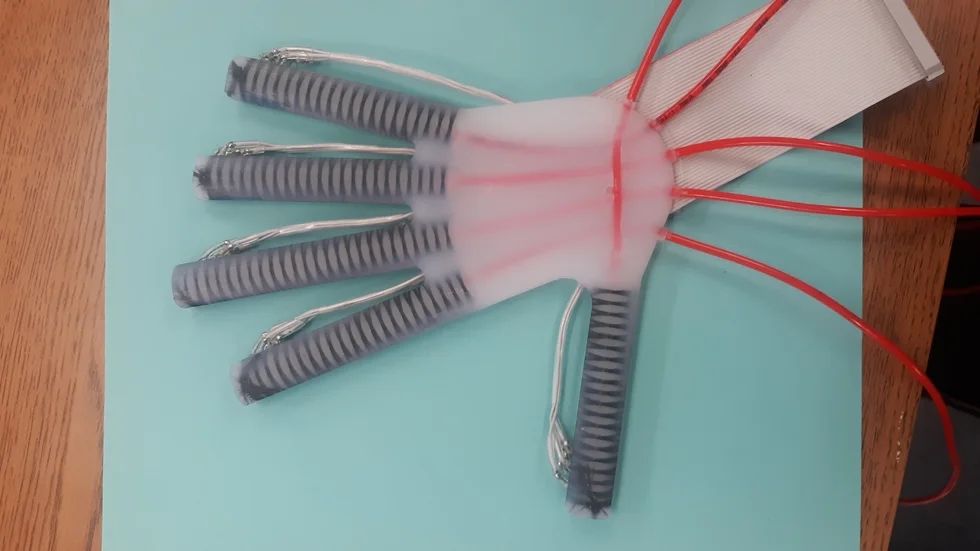Stroke patients often face the challenge of relearning manual tasks due to limb weakness. To address this issue, scientists have developed a groundbreaking solution in the form of smart gloves. These gloves utilize artificial intelligence, touch sensors, and actuators to mimic natural hand movements. By providing real-time feedback and guidance, these innovative gloves enable stroke patients to regain their motor skills and potentially even rediscover their passion for music. Smart gloves!
The Impact of Stroke on Manual Movements
A stroke can severely impair a person’s ability to move their hands, fingers, or wrists effectively. This limitation hampers daily activities that require fine motor skills and coordination. Imagine no longer being able to play an instrument or engage in hobbies involving delicate hand movements. It is a frustrating reality faced by many stroke survivors.
Introducing the Exoskeleton Glove
The exoskeleton glove represents a significant advancement in stroke rehabilitation technology. Equipped with advanced AI algorithms, touch sensors, and actuators, it has the capability to “feel” the difference between correct and incorrect hand movements during piano playing sessions.
Teaching through Feedback
The primary objective of these smart gloves is not just assistance but also education – teaching patients how to recognize mistakes in their movements actively. As users wear the gloves while playing the piano, they receive instant feedback on where they went wrong in terms of technique or accuracy. Armed with this knowledge about their performance shortcomings, individuals can make necessary adjustments for improvement.
Accordingly, Dr Erik Engeberg from Florida Atlantic University’s Department of Ocean and Mechanical Engineering explains,
“We found that the glove can learn to distinguish between correct and incorrect piano play…This means it could be a valuable tool for personalized rehabilitation.“
Addressing Stroke Rehabilitation Challenges at Scale
Stroke affects millions worldwide; hence there is an urgent need for effective solutions catering to diverse patient needs. In the UK alone, approximately 1.2 million stroke survivors face various physical and cognitive challenges as they strive to rebuild their lives after a stroke. Limb weakness, visual impairments, and language difficulties are common consequences of strokes.
The Promise of Smart Gloves
The initial experiments with the smart gloves demonstrated promising results. By pre-programming movements to play the nursery rhyme “Mary had a little lamb” on the piano, researchers showcased how stroke patients could benefit from this technology in relearning complex manual tasks.
However,
Researchers acknowledge that further improvements are necessary to enhance accuracy and adaptability for individual users.
- Juliet Bouverie, Chief Executive of the Stroke Association remarks,
“It’s an exciting time for technology in stroke research…We hope the results of this research will help build on our current understanding to bring about effective treatments to help rebuild lives after a stroke.”
As advancements continue,
It is envisioned that these smart gloves can be personalized for each patient based on their specific needs and abilities.
- This would empower individuals with disabilities resulting from strokes or other conditions by helping them regain arm function through innovative rehabilitation methods.
Conclusion
Smart gloves represent a significant breakthrough in assisting stroke patients with limb weakness in relearning manual tasks such as playing musical instruments like the piano. Through real-time feedback and guidance, these gloves facilitate active learning while minimizing passive interventions during rehabilitation sessions. As researchers continue refining this technology and exploring its potential applications beyond music therapy, there is hope that it will ultimately improve outcomes for millions affected by strokes worldwide.
With ongoing developments in assistive technologies like smart gloves,
The future holds great promise for enhancing post-stroke rehabilitation programs.
- By harnessing cutting-edge innovations such as AI algorithms combined with touch sensors and actuators,
Stroke survivors may find renewed motivation and opportunity to reclaim lost skills – one keystroke at a time!
Image by: Frontiers
Learn here more about AI and Machine Learning.
You can also reach out our social media team by following our pages on Facebook, Instagram and Twitter.


